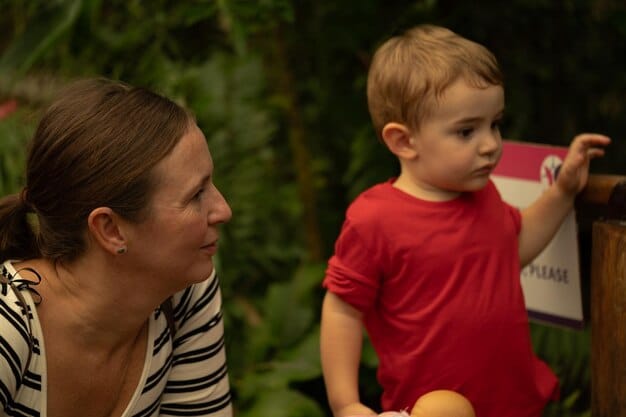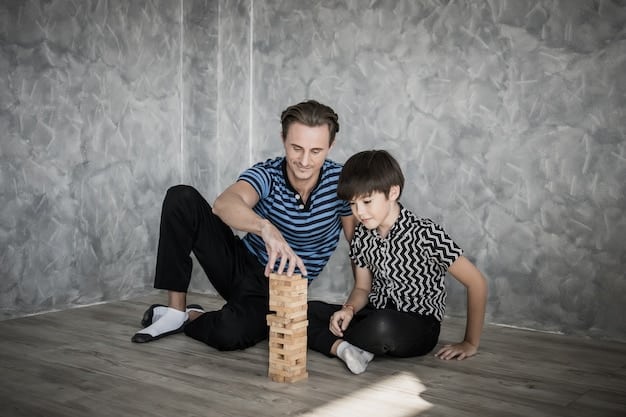Single Dad’s Guide: Addressing Your Child’s Emotional Needs

Addressing Your Child’s Emotional Needs: A Single Father’s Guide to Providing Support and Understanding involves being attuned to their feelings, offering unwavering support, and creating a safe space for open communication, ultimately fostering emotional resilience and well-being.
Navigating parenthood as a single father presents unique challenges, especially when it comes to Addressing Your Child’s Emotional Needs: A Single Father’s Guide to Providing Support and Understanding. This guide offers practical advice and insights to help you foster a strong, emotionally healthy relationship with your child.
Understanding Your Child’s Emotional World
Understanding your child’s emotional world is the bedrock of effective parenting. It’s about tuning into their feelings, recognizing that their emotions are valid, and responding in a way that makes them feel heard and understood.
Children experience a wide range of emotions, from joy and excitement to sadness and frustration. As a parent, your role is to help them navigate these emotions in a healthy and constructive way.
Recognizing Emotional Cues
Children don’t always express their emotions verbally. Often, they communicate through their behavior, body language, and even physical symptoms.
Creating a Safe Space
A safe space is essential for children to feel comfortable expressing their emotions. This means creating an environment where they know they won’t be judged, criticized, or dismissed.

- Active Listening: Put away distractions, make eye contact, and truly listen to what your child is saying.
- Empathy: Try to see things from your child’s perspective and understand their feelings.
- Validation: Acknowledge and validate your child’s emotions, even if you don’t agree with their behavior.
By understanding your child’s emotional world, recognizing their cues, and creating a safe space for expression, you lay the foundation for a strong and emotionally healthy relationship.
Communication is Key: Talking and Listening
Open communication is the lifeblood of any healthy relationship, especially between a parent and child. It involves both talking and listening, creating a two-way street where thoughts and feelings can be shared freely.
As a single father, fostering open communication can be particularly crucial. Your child may be navigating unique challenges and need a trusted adult to confide in.
Initiating Conversations
Don’t wait for your child to come to you. Take the initiative to start conversations, even if it’s just about their day at school or their favorite hobby.
Asking Open-Ended Questions
Instead of asking questions that can be answered with a simple “yes” or “no,” ask open-ended questions that encourage your child to share their thoughts and feelings.
- What was the best/worst part of your day?
- How did that make you feel?
- What are you looking forward to this week?
Remember, communication is a skill that takes practice. Be patient, persistent, and always approach conversations with a genuine desire to connect with your child.
Building a Strong Father-Child Bond
A strong father-child bond is essential for your child’s emotional well-being. It provides a sense of security, love, and belonging that can last a lifetime.
As a single father, you may need to be intentional about building this bond, making time for quality interactions and shared experiences.
Quality Time Over Quantity
It’s not just about the amount of time you spend with your child, but the quality of that time. Put away distractions, be present, and focus on connecting with your child.
Shared Activities and Interests
Find activities and interests that you and your child both enjoy. This could be anything from playing sports to reading books to cooking meals together.

- Schedule regular “date nights” with your child.
- Volunteer together in your community.
- Take a class together, like art or music.
Building a strong father-child bond takes time and effort, but it’s an investment that will pay dividends in your child’s emotional health and happiness.
Discipline with Love and Understanding
Discipline is an essential part of parenting, but it should always be approached with love and understanding. The goal of discipline is not to punish, but to teach and guide your child.
As a single father, it’s important to be consistent with your discipline, setting clear expectations and boundaries for your child.
Focus on Positive Reinforcement
Catch your child being good and reward them for their positive behavior. This could be as simple as a verbal compliment or a small treat.
Consequences Over Punishment
When your child misbehaves, focus on consequences rather than punishment. Consequences should be logical, related to the behavior, and designed to teach a lesson.
Disciplining with love and understanding helps your child learn from their mistakes, develop self-control, and build a strong sense of self-worth.
Seeking Support When Needed
Parenting is a challenging job, and it’s okay to ask for help when you need it. As a single father, you may face unique challenges and benefit from seeking support from others.
There are many resources available to help single fathers, including support groups, parenting classes, and mental health professionals.
Connecting with Other Single Parents
Join a support group for single parents. This is a great way to connect with others who understand what you’re going through, share tips and advice, and build a sense of community.
Therapy or Counseling
If you’re struggling with your mental health or your child’s, don’t hesitate to seek professional help. A therapist or counselor can provide support, guidance, and strategies for coping with challenges.
Remember, seeking support is a sign of strength, not weakness. It shows that you’re committed to being the best parent you can be.
Self-Care for Single Fathers
As a single father, it’s easy to get caught up in taking care of your child and forget about your own needs. However, self-care is essential for your well-being and your ability to be a good parent.
When you take care of yourself, you’re better equipped to handle the challenges of parenting and provide your child with the love and support they need.
Prioritizing Physical Health
Make sure you’re getting enough sleep, eating a healthy diet, and exercising regularly. These habits can improve your mood, energy levels, and overall health.
Schedule Time for Relaxation and Fun
Set aside time each week for activities you enjoy. This could be anything from reading a book to going for a walk to spending time with friends.
- Find a hobby that you’re passionate about.
- Practice mindfulness or meditation.
- Connect with nature.
Remember, taking care of yourself is not selfish, it’s essential. When you prioritize self-care, you’re investing in your well-being and your ability to be a supportive and loving father.
Celebrating Milestones and Achievements
Celebrating milestones and achievements, both big and small, is an important way to show your child that you’re proud of them and that you value their accomplishments.
These celebrations don’t have to be elaborate or expensive. The most important thing is to show your child that you’re paying attention and that you care.
Verbal Praise and Encouragement
Offer specific praise for your child’s efforts and accomplishments. Instead of saying “Good job,” try saying “I’m so proud of how hard you worked on that project.”
Small Rewards and Treats
Offer small rewards or treats for achieving goals. This could be anything from a sticker to a special outing.
Celebrating milestones and achievements helps your child build confidence, develop a positive self-image, and feel loved and appreciated.
| Key Point | Brief Description |
|---|---|
| ❤️ Understanding Emotions | Recognize and validate your child’s feelings to create a safe space. |
| 🗣️ Open Communication | Encourage conversations and actively listen to your child’s thoughts and feelings. |
| 👨👧👦 Bonding Activities | Spend quality time together engaging in shared interests and activities. |
| 💪 Seeking Support | Don’t hesitate to reach out for help from support groups or professionals. |
Frequently Asked Questions
▼
Look for changes in behavior, sleep patterns, appetite, or withdrawal from activities they once enjoyed. Increased irritability or sadness can also be signs.
▼
Focus on positive reinforcement, setting clear expectations, and using logical consequences. Avoid physical punishment and focus on teaching valuable lessons.
▼
Listen without judgment, validate their emotions, and let them know it’s okay to feel what they are feeling. Show empathy and offer your support.
▼
Prioritize self-care by scheduling time for activities you enjoy, maintaining your physical health, and seeking support when needed. Remember, you can’t pour from an empty cup.
▼
Many organizations offer support groups, parenting classes, and counseling services specifically for single fathers. Online resources and community centers can also provide helpful information.
Conclusion
Addressing Your Child’s Emotional Needs: A Single Father’s Guide to Providing Support and Understanding is a journey that requires patience, empathy, and a commitment to open communication. By focusing on these key areas, single fathers can create a nurturing environment where their children feel loved, supported, and empowered to thrive.





